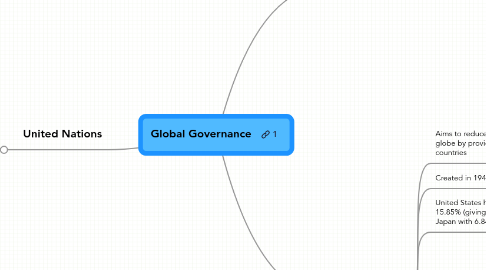
1. United Nations
1.1. Has six Principal Organs
1.1.1. Economic and Social Council
1.1.1.1. Responsible for coordinating the economic, social and related work of 14 UN specialized agencies.
1.1.1.2. Comprised of 54 member-states, which hold an annual four-week meeting in July
1.1.2. International Court of Justice
1.1.2.1. The primrary Judical Organ of the UN. Its purpose is to settle legal disputes submitted to it by states and to provide advisory opinions on legal questions submitted to it.
1.1.3. Trusteeship Council
1.1.3.1. Is a currently inactive principal organ of the UN, thats task was to ensure UN trust territories were administrated in the best possible ways that were relevant to the interests of the inhabitants and International peace and security.
1.1.4. General Assembly
1.1.4.1. Oversees the budget, appoints non-permanent security council members and receives reports from other arms of UN
1.1.4.2. All member states (currently 193) are represented equally.
1.1.5. Security Council
1.1.5.1. Aims to maintain International peace and security. Can pass resolutions that are binding on other states
1.1.5.2. Comprised of 5 permanent states that each wield veto power (US, UK, France, Russia, China) and 10 non-permanent states that are appointed by the General Assembly
1.1.6. Secreteriat
1.1.6.1. Serves to administrate peacekeeping operations and to make surveys/studies about different countries' economic and social trends.
1.1.6.2. Headed by the Secretary-General of the UN, who is appointed by the General Assembly. The current Secretary-General is Ban Ki-moon
2. International Monetary Fund (IMF)
2.1. Aims to promote international economic cooperation, international trade, employment, and exchange rate stability
2.1.1. Achieves this by conducting research, producing statistics and loaning money to help states overcome economic difficulty
2.2. Created in 1944
2.2.1. Was formed at the same conference that the World Bank was formed
2.3. Receives its funding from member states. Has a large holding of hold (90 million ounces) making it the third largest gold holder in the world.
2.4. United States has a vote percentage of 16.75%, giving it a veto power. It is followed by Japan with 6.23%
2.5. Latvia's resurgence after the GFC is a success of the IMF. During the Global Financial Crisis, it had a tough time and suffered a 25% decline in its GDP. It sought assistance from the IMF and the EU and in the first quarter of 2012, it has had an economic growth of 6.8%.
2.6. It is criticized for the ways it conducts its economic programs as they are considered to hurt the poorest in the country the most.
3. World Bank
3.1. Aims to reduce poverty across the globe by providing loans to developing countries
3.2. Created in 1944
3.3. United States has the most voting power with 15.85% (giving it a veto power). It is followed by Japan with 6.84%
3.4. Comprised of 2 institutes, International Bank for Reconstruction and Development and International Development Association
3.4.1. The International Bank for Reconstruction and Development aims to reduce poverty in middle-income countries
3.4.1.1. Seeks to achieve these aims by promoting sustainable development through loans, guarantees, risk management products, and analytical and advisory services.
3.4.2. The International Development Association aims to help the worlds poorest countries.
3.4.2.1. To achieve this aim, it provides loans, grants for programs that boost economic growth, reduce inequalities, and improve people’s living conditions.
